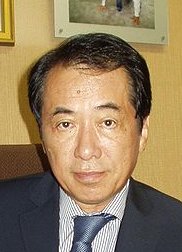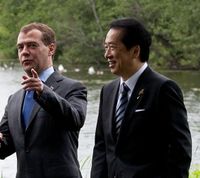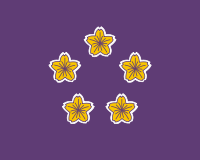Naoto Kan
- In this Japanese name, the family name is Kan.
| Naoto Kan 菅 直人 |
|
 Kan in 2007. |
|
|
|
|
| Incumbent | |
| Assumed office 8 June 2010 |
|
| Monarch | Akihito |
|---|---|
| Preceded by | Yukio Hatoyama |
|
Minister of Finance
|
|
| In office 6 January 2010 – 8 June 2010 |
|
| Prime Minister | Yukio Hatoyama |
| Preceded by | Hirohisa Fujii |
| Succeeded by | Yoshihiko Noda |
|
Deputy Prime Minister of Japan
|
|
| In office 16 September 2009 – 8 June 2010 |
|
| Prime Minister | Yukio Hatoyama |
| Preceded by | Vacant last held by Wataru Kubo on 11 January 1996 |
| Succeeded by | Vacant |
|
Minister of State for Economic and Fiscal Policy
|
|
| In office 16 September 2009 – 8 June 2010 |
|
| Prime Minister | Yukio Hatoyama |
| Preceded by | Yoshimasa Hayashi |
| Succeeded by | Satoshi Arai |
|
Minister of State in charge of National Strategy
|
|
| In office 16 September 2009 – 6 January 2010 |
|
| Prime Minister | Yukio Hatoyama |
| Preceded by | Position established |
| Succeeded by | Yoshito Sengoku |
|
Minister of State for Science and Technology Policy
|
|
| In office 16 September 2009 – 6 January 2010 |
|
| Prime Minister | Yukio Hatoyama |
| Preceded by | Seiko Noda |
| Succeeded by | Tatsuo Kawabata |
|
Minister of Health and Welfare
|
|
| In office 11 January 1996 – 7 November 1996 |
|
| Prime Minister | Ryutaro Hashimoto |
| Preceded by | Chūryō Morii |
| Succeeded by | Junichiro Koizumi |
|
|
|
| Born | 10 October 1946 Ube, Japan |
| Political party | Democratic Party |
| Spouse(s) | Nobuko Kan (1970–present) |
| Children | Gentarō Kan Shinjirō Kan |
| Alma mater | Tokyo Institute of Technology |
| Website | Official website |
Naoto Kan (菅 直人 Kan Naoto, born 10 October 1946) is the current Prime Minister of Japan. In June 2010, as Finance Minister, Kan was elected as the leader of the Democratic Party of Japan (DPJ) and was designated Prime Minister by the Diet and later by Emperor of Japan, in each instance to succeed Yukio Hatoyama.
Contents |
Early life
Kan was born in Ube City, Yamaguchi Prefecture as the son of Hisao Kan, an executive for a glass manufacturer.
He graduated in 1970 from the Tokyo Institute of Technology and became a licensed benrishi (patent agent/attorney) in 1971.
Career
After graduating from university, Kan worked at a patent office for four years.[1] He actively engaged in civic grassroots movements for years and also served on election campaign staff for Fusae Ichikawa, a women's rights activist.[2]
After having lost in 1976, 1979 general elections and 1977 Upper House election, Kan finally achieved a seat in the lower house in 1980 as a member of Socialist Democratic Federation. He gained national wide popularity in 1996, when serving as the Minister of Health and Welfare, admitting government's responsibility for the spread of HIV-tainted blood in 1980s and directly apologized to victims. At that time, he was a member of a small party forming the ruling coalition with the Liberal Democratic Party (LDP). His frank action was completely unprecedented and was applauded by the media and the public.
In 1998, his image was affected by allegations of an affair, vigorously denied by both parties, with a television newscaster and media consultant, Yūko Tonomoto.[3] After Yukio Hatoyama resigned as the leader of the Democratic Party of Japan (DPJ), Kan again took over the position. In July 2003, the DPJ and the Liberal Party led by Ichirō Ozawa agreed to form a uniformed opposition party to prepare for the general election that was anticipated to take place in the fall.
During the campaign of the election of 2003, the DPJ called the election as the choice of the government between the ruling LDP-bloc and the DPJ, with Kan being presented as the alternative candidate to then Prime Minister Junichiro Koizumi. His face was used as the trademark of the campaign against the LDP.
However, in 2004, Kan was accused of unpaid annuities and forced to again resign the position of leader. On May 10, 2004, he officially announced his resignation and made the Shikoku Pilgrimage. Later, the Ministry of Health, Labour and Welfare spokesman apologized, saying the unpaid record was due to an administrative error.
In mid-October 2005, Kan, who turned 60 in 2006, proposed the creation of a new political party to be called the "Dankai (baby boomer) Party." The initial intent of the party was to offer places of activity for the Japanese baby boomers – 2.7 million of whom began to retire en masse in 2007.
He believes the Japan Self-Defense Forces should play a more prominent role on the international stage.[4]
Finance Minister
On January 6, 2010, he was picked by Yukio Hatoyama to be the new Finance Minister, assuming the post in addition to deputy prime minister.[5] In his first news conference, Kan announced his priority was stimulating growth and took the unusual step of naming a specific dollar-yen level as optimal to help exporters and stimulate the economy. "There are a lot of voices in the business world saying that (the dollar) around ¥95 is appropriate in terms of trade," he said.[6] Hatoyama appeared to rebuke Kan. "When it comes to foreign exchange, stability is desirable and rapid moves are undesirable. The government basically shouldn't comment on foreign exchange," he told reporters.[7]
Prime Minister

On 2 June 2010, Yukio Hatoyama announced his intention to resign as the leader of the Democratic Party of Japan (DPJ) and as Prime Minister, also saying that he had urged his backer in the party, Ichiro Ozawa, to resign as Secretary General.[8][9] The Cabinet resigned en masse on the morning of 4 June.[8] Foreign Minister Katsuya Okada and Land and Transport Minister Seiji Maehara, though once considered to be possible successors to Hatoyama, announced their support for Naoto Kan.[10] Kan, at his age of 63, won the leadership of the DPJ with 291 votes to 129, defeating a relatively unknown Ozawa-backed legislator Shinji Tarutoko, 50,[8][11] who was leading the environmental policy committee in the lower house of the Diet.[12]
Subsequently, on 4 June, Kan was designated as Prime Minister by the Diet.[13] Although the Prime Minister is formally appointed by the Emperor, the Constitution of Japan explicitly requires the Emperor to appoint whoever is designated by the Diet. On 8 June, Emperor Akihito formally appointed Kan as the country's 94th Prime Minister, and the 29th postwar Prime Minister. Kan apologised to the Republic of Korea on the 100th anniversary of the Japan–Korea Annexation Treaty.
Family
He married his wife Nobuko in 1970. They are first cousins, so their engagement was opposed by their parents.[14][15] They have two sons, Gentarō and Shinjirō. Gentaro is a civil right activist and lost in elections for the Lower House in 2003 and 2005. Shinjiro is a veterinarian and works at an animal hospital in Nerima, Tokyo.[16]
His hobbies are go, shogi and mahjong.[17] Kan built a machine to calculate the complicated mahjong point system and applied for a patent in 1973.[18]
Kan has earned the nicknames 'Ira-Kan' or 'Fretful-Kan' due to his reputed short temper.
References
- ↑ "Japan Producer インタビュー" (in Japanese). Japan Producer. September, 2002. http://www.dot-jp.or.jp/mm/interview/jpi/12/. Retrieved June 8, 2010.
- ↑ All things have finally come to veteran who waited, The Japan Times, June 5, 2010
- ↑ Landers, Peter (February 4, 1999). "Dream Deffered". Far Eastern Economic Review. http://tomcoyner.com/dream_deferred.htm. Retrieved June 4, 2010.
- ↑ "Power Players: Naoto Kan". The Diplomat. http://apac2020.the-diplomat.com/power-players/naoto-kan/. Retrieved June 4, 2010.
- ↑ McCallum, Kenneth (January 6, 2010). "Kan to Take Over as Japanese Finance Chief". The Wall Street Journal. http://online.wsj.com/article/SB126277442618617661.html?mod=WSJ_hps_LEFTWhatsNews. Retrieved January 6, 2010.
- ↑ Takashi Nakamichi (January 7, 2010). "Kan Calls for Weaker Yen". Wall Street Journal. http://online.wsj.com/article/SB126285391946519405.html?mod=WSJ_hps_LEFTWhatsNews. Retrieved January 7, 2010.
- ↑ Nakamichi, Takashi (January 8, 2010). "New Japan Minister Starts Talking Yen Down". Wall Street Journal. http://online.wsj.com/article/SB126285391946519405.html#mod=todays_us_page_one. Retrieved January 8, 2010.
- ↑ 8.0 8.1 8.2 Finance Chief Chosen as Next Japanese Leader, by Martin Fackler, The New York Times, June 3, 2010. Retrieved June 3, 2010.
- ↑ Ozawa's resignation at strong urging of PM will lessen his influence on DPJ, Mainichi Daily News, June 2, 2010. Retrieved June 6, 2010.
- ↑ "Okada, Maehara, Noda Support Kan For DPJ Presidency". Nikkei. 2010-06-03. http://e.nikkei.com/e/fr/tnks/Nni20100603D03EE230.htm. Retrieved 2010-06-08.
- ↑ "民主党の新代表・総理大臣に菅直人氏選出 (毎日新聞) – Yahoo!JAPAN ニュース" (in Japanese). Mainichi Shimbun. Headlines.yahoo.co.jp. http://headlines.yahoo.co.jp/hl?a=20100604-00000013-maiall-pol. Retrieved 2010-06-07.
- ↑ Nishikawa, Yoko (2010-06-03). "FACTBOX-Japan lawmaker Tarutoko to run for ruling party head". Reuters. http://www.reuters.com/article/idUSTOE65205020100603. Retrieved 2010-06-08.
- ↑ "Kan elected prime minister". Asahi Shimbun. 4 June 2010. http://www.asahi.com/english/TKY201006040248.html. Retrieved 4 September 2010.
- ↑ Keating, Joshua (June 8, 2010). "Japan's prime minister is married to his first cousin". Foreign Policy. http://blog.foreignpolicy.com/posts/2010/06/08/japans_prime_minister_is_married_to_his_first_cousin. Retrieved June 14, 2010.
- ↑ "基礎から分かる(菅直人)" (in Japanese). Yomiuri Shimbun. June 5, 2010. http://www.yomiuri.co.jp/feature/20100604-612891/fe_100605_pr_kankiso.htm?from=yolsp. Retrieved June 8, 2010.
- ↑ "ヒラミ動物病院" (in Japanese). http://www.hirami.co.jp/info.html. Retrieved June 8, 2010.
- ↑ "Kan: Activist, politico, mah-jongg lover". AsiaOne News. 2010-06-05. http://news.asiaone.com/News/Latest%2BNews/Asia/Story/A1Story20100605-220351.html. Retrieved 2010-06-08.
- ↑ Hayashi, Yuka (2010-06-04). "Japan's Premier Aims for Longer Stay". The Wall Street Journal. http://online.wsj.com/article/SB10001424052748704764404575285761944018110.html?mod=WSJ_hpp_MIDDLENexttoWhatsNewsTop. Retrieved 2010-06-08.
External links
| House of Representatives of Japan | ||
|---|---|---|
| Preceded by Kiyoshi Ōno Akira Kudō Shōzō Hasegawa Kiyoshi Ozawa |
Representative for Tokyo's 7th district (multi-member) 1980–1996 Served alongside: Shōzō Hasegawa, Kiyoshi Ozawa, Kiyoshi Ōno, Kōichirō Watanabe, Yuriko Ōno |
Constituency abolished |
| New constituency | Representative for Tokyo's 18th district 1996–present |
Incumbent |
| Political offices | ||
| Preceded by Chūryō Morii |
Minister of Health and Welfare 1996 |
Succeeded by Junichiro Koizumi |
| Preceded by Wataru Kubo |
Deputy Prime Minister of Japan 2009–2010 |
Vacant |
| Preceded by Yoshimasa Hayashi |
Minister of State for Economic and Fiscal Policy 2009–2010 |
Succeeded by Satoshi Arai |
| New title | Minister of State in charge of National Strategy 2009–2010 |
Succeeded by Yoshito Sengoku |
| Preceded by Seiko Noda |
Minister of State for Science and Technology Policy 2009–2010 |
Succeeded by Tatsuo Kawabata |
| Preceded by Hirohisa Fujii |
Minister of Finance 2010 |
Succeeded by Yoshihiko Noda |
| Preceded by Yukio Hatoyama |
Prime Minister of Japan 2010–present |
Incumbent |
| Party political offices | ||
| New political party | Leader of the Democratic Party 1996–1997 Served alongside: Yukio Hatoyama |
Succeeded by Himself |
| Preceded by Yukio Hatoyama |
Leader of the Democratic Party 1997–1998 |
|
| New political party | President of the Democratic Party 1998–1999 |
Succeeded by Katsuya Okada |
| Preceded by Tsutomu Hata |
Secretary General of the Democratic Party 2000–2002 |
Succeeded by Kansei Nakano |
| Preceded by Yukio Hatoyama |
President of the Democratic Party 2002–2004 |
Succeeded by Katsuya Okada |
| President of the Democratic Party 2010–present |
Incumbent | |
|
||||||||||||||
|
|||||||||||||||||
|
|||||
|
|||||
|
|||||
|
|||||
|
|||||
